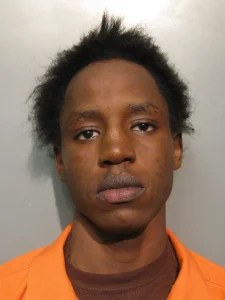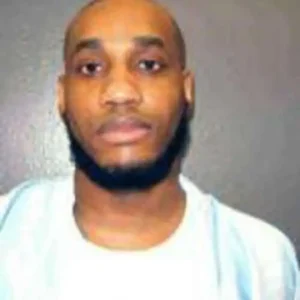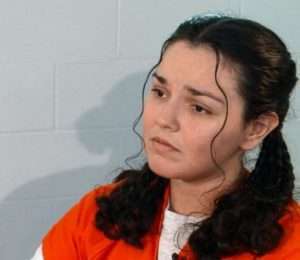Brice Rhodes is a killer from Kentucky who was convicted of three counts of murder
According to court documents Brice Rhodes would murder Christopher Jones, 40, who was fatally shot. However he was not done there. Brice was then worried that two teenagers would go to the police and tell them that he was responsible so Rhodes would stab to death 14-year-old Larry Ordway and 16-year-old Maurice “Reece” Gordon. After the teens were murdered their bodies would be dumped behind an apartment
Brice Rhodes would be arrested and convicted of the triple murder. Rhodes faces a sentenced of life of parole. The judge ruled that he is ineligible for the death penalty due to his cognitive level
Brice Rhodes Case
A Louisville jury deliberated less than five hours Monday night before finding Brice Rhodes guilty on all six charges against him, including three murder counts.
Brice Rhodes was found guilty of murdering Christopher Jones, Maurice Gordon and Larry Ordway in 2016, one count of tampering with physical evidence, and two counts of abuse of a corpse in the brutal beating and stabbings of Gordon and Ordway.
He is facing a possible sentence of life in prison without the possibility of parole. The sentencing phase will begin Tuesday afternoon.
The verdict came down just before 9:30 p.m., several hours after closing arguments ended and the jury began deliberations in the case.
The prosecution rested their case Friday and the defense did not call any witnesses on Monday with Brice Rhodes deciding not to testify.
An attorney for Brice Rhodes told a jury earlier on Monday that the bloody, horrific murder scene described at the opening of the week-long triple murder trial as well the the amount of police evidence allegedly pointing to Rhodes was in opposition to what witnesses described.
“It’s important to remember what you actually heard, what you actually saw from the witness stand,” said attorney Tom Griffiths in his closing arguments, in which he accused police in the case of focusing on Rhodes at the exclusion of other suspects.
But in her closing statements, Assistant Commonwealth’s Attorney Elizabeth Jones Brown told jurors eye witnesses testified that in early May 2016, they saw Rhodes kill Christopher Jones, who he believed was another man that had a bounty out for his death.
“He killed an innocent man for no reason,” she said.
And just a few weeks later, witnesses testified Rhodes brutally tortured and murdered teen brothers Ordway and Gordon because he believed they were telling their family about the shooting, she said.
Brice Rhodes forced other teens to help kill the brothers and clean up the crime, which is why there wasn’t a bloody murder scene, Jones Brown said in her closing statements.
“Brice Rhodes preyed on this group of children,” she said. “Please bring this seven-year nightmare to an end.”
Two of those men involved with the murders, teenage cousins Anjuan Carter and Jacorey Taylor, cut deals for lesser sentences and testified during the trial that Rhodes was the mastermind, forcing them to take part in the killings.
“They were there because Brice Rhodes brought them there,” Jones Brown said.
The prosecution rested their case Friday and the defense did not call any witnesses on Monday with Brice Rhodes deciding not to testify.
Testimony during the trial showed police found very little in an original search of Rhodes’ home and it took a second search later when they found splotches of blood on his carpet, Griffiths told jurors. There was no video of the scene for either search.
In addition, Griffiths noted there were several adults at Rhodes’ home in May 2016 when he allegedly brutally tortured and murdered Ordway and Gordon. But police focused on Rhodes as the mastermind at the exclusion of other suspects.
“The government was picking and choosing what they showed you in this courtroom,” he said. “The police already decided who they wanted to charge. They had their guy.”
Griffiths said the testimony of Carter and Taylor sounded like “something they had cooked up” to make themselves seem like victims of Rhodes.
“There is no question they lied; they changed their story,” Griffiths told the jury. “They would have said anything the police wanted them to say.”
Jones Brown maintained that the cousins were consistent that the brothers were tied up, that one was put in the bathroom as the other was killed and that they were forced by Rhodes to participate in the murders.
As the defense did throughout the trial, Griffiths criticized the investigation by the Louisville Metro Police Department, noting, for example that an officer previously testified police recovered the back seat of Rhodes’ car, where the teen brothers’ bodies had been placed after they were killed.
But police later said they never found the car seat, that the officer was mistaken in his testimony.
“It raises serious doubt about their credibility,” Griffiths said.
Rhodes, according to prosecutors, heard that Gordon, 16, and Ordway, 14, were telling family members about the Jones murder, so he brought them to his home on May 22, 2016.
After a brief scuffle, Gordon was tied up and a toboggan placed over his head, while Ordway was moved into a bathroom where he listened to his brother scream and “beg for forgiveness,” Assistant Commonwealth’s Attorney Critt Cunningham said in his opening.
Rhodes – and other men at the home – beat and stabbed Gordon, then rolled his body out of the way and brought Ordway in and the “the process was started over,” Cunningham told jurors.
The three then allegedly put the two brothers into a car and dumped them in the backyard of an abandoned house in the 400 block of River Park Drive, east of Shawnee Park, and burned the bodies. Carter has told police he stayed behind and cleaned up after the murders.
Rhodes, 32, is charged with three counts of murder, tampering with physical evidence, abuse of a corpse and receiving stolen property. He is facing a possible life in prison sentence.
Jefferson Circuit Court Judge Julie Kaelin found that while Rhodes is competent to stand trial, he is ineligible for the death penalty, ruling he has a documented history of serious mental illness or intellectual disability.
Rhodes had a history of outbursts in court, threatening at least one judge, accusing a prosecutor and another judge of having an affair, lashing out at several of his attorneys and calling several court officials racist.
He was told by Kaelin that he would be removed from court or shocked by an ankle monitor if he is disruptive during his trial starting next week.
Rhodes, who wore a suit and was not shackled, has been quiet throughout the trial.









